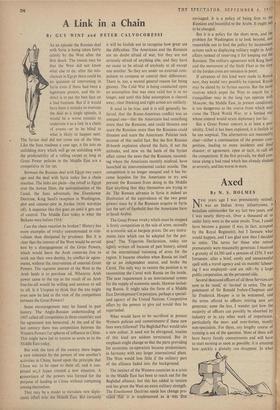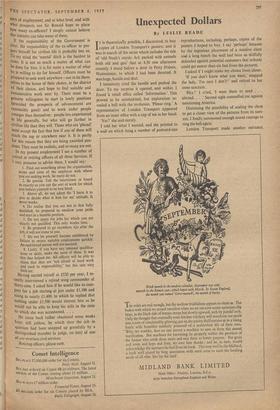Axed
By N. S. HOLMES NINE years ago I was prematurely retired; I was an Indian Army infantryman, a battalion commander for my last two years, and I was nearly thirty-six. Over a thousand of us under forty were in the same straits. True, I could have become a gunner (I was, in fact, accepted by the Royal Regiment), but I foresaw what would happen, and I am glad now that I decided to retire. The terms for those who retired prematurely were reasonably'generous; I received a gratuity of £4,500 and a pension of £356. I was fortunate; after a brief, costly and unsuccessful spell with a travel agency and six months' labour- ing I was employed—and am still—by a large public corporation, on the personnel side.
Several thousand officers of all three Services are now to be 'axed,' or 'invited' to retire. The ap- pointment of Sir Ronald Ivelaw-Chapman and Sir Frederick Hooper is to be welcomed, and the terms offered to officers retiring now are generous; none the less, I wonder just how the majority of officers can possibly be absorbed by industry or in any other work of importance, particularly the near- and over-forties, mostly non-specialists. For them, any lengthy course of training is out of the question. Most of them will have heavy family commitments and will have to start earning as soon as possible; it is amazing how quickly a gratuity can disappear. In what sorts of employment, and at what level, and with What prospects can Sir Ronald hope to place how many ex-officers? I simply cannot believe that industry can take many of them. If the responsibility of the Government is clear, the responsibility of the ex-officer to pre- pare himself for civilian life is probably less so. To my mind the 'mental' ditch is the hardest to cross. It is not so much a matter of what can be done for him; it is far more a matter of what he is willing to do for himself. Officers must be prepared to seek work anywhere—not to tie them- selves to the house of their choice, in the district of their choice, and hope to find suitable and remunerative work near by. There must be a genuine willingness to start in lowly positions (provided the prospects of advancement are reasonably good) and to work under people Younger than themselves : people less experienced in life generally, but who will go farther in civilian life than they will. Those who are 'placed' must accept the fact that few if any of them will reach the top or anywhere near it. It is partly for this reason that they are being awarded pen- sions. They must be realistic, and so many are not.
In my present employment I see a number of retired or retiring officers of all three Services. If I may presume to advise them, I would say :
1. Find out something about the organisation, scope and aims of the employer with whom you are seeking work. So many do not.
2. Be precise. Tell the interviewer or board as exactly-as you can the sort of work for which You believe yourself to be best fitted.
3. Above all, do not adopt the 'I leave it to you to decide what is best for me' attitude. It never works.
4. Do realise that you are not at first fully qualified; be prepared to swallow your pride and start in a humble position.
5. Do not apply for jobs for which you are clearly not qualified, This only wastes time.
6. Be prepared to go anywhere. Go after the job, it will not come to you.
7. Do not let yourself become embittered by failure to secure suitable employment quickly. An embittered person will not succeed. 8. Lastly, if you have any unusual qualifica- tions or skills, make the most of them. It was this that helped me. All officers will be able to claim that they are 'not afraid of hard work and used to responsibility,' but this cuts very little ice.
Having started myself at £520 per year, I re- cently interviewed a retired wing commander of thirty-nine. T asked him if he would like to com- Pete for a job starting at just under £1,100 and rising to nearly £1 ,400, to which he replied that nothing under £1,500 would interest him as he would not be able to keep his wife in the state to which she was accustomed. . . .
He came back rather chastened some weeks later, still jobless, by which time the job in question had been snapped up gratefully by a distinguished member (a judge, no less) of one of our overseas civil services.
Retiring officers, please note.
)t

































 Previous page
Previous page